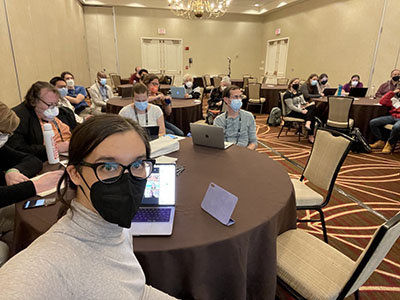Two years ago I was on a train to Portland, Oregon in an N-95 mask I had from an old painting project. My car was nearly empty, but a couple boarded in Olympia and sat in the seats next to me. I moved to the other side of the car, and they looked at me with confusion. I was frantically reviewing slides, as over the past week, more than a dozen colleagues had reached out to see if I was still going to SIGCSE 2020, and if so, if I’d be willing to present their work for them. I’d said yes, mostly out of a sense of duty: I had a lot to do at the conference and others were in more vulnerable positions, so I figured I would just take on the load and make the most of what was sure to be a strange week.
When I arrived, I saw the organizers in the lobby of the main conference hotel; they had dire looks on their faces. Everyone in the lobby seemed nervous and on edge. I continued to wear my mask, while I encountered old friends in the lobby. I went out to dinner with colleagues and had the strong sense that this was the last time I’d be in a restaurant for a while. The next morning, the conference was canceled, and I took a train back home.
Nothing would ever be the same.
Two years later, I’m here on a flight to Boston, headed to the 2022 SIGCSE Technical Symposium. Many of the same feelings are at play: I’m a bit nervous, travelers are on edge, and no one is quite sure what the conference will be like. But there is a sense that it will happen and that it will be safe. But also that it won’t be the same. Many in our community aren’t ready to take the risk and will be participating remotely. And those who can attend—with travel approval, sufficient funding,and the freedom to step away from teaching—is a very different group than those likely attending online. I don’t think anyone expects it to be a return to what SIGCSE looked like in 2019, rich and vibrant in the cold Minneapolis. But I think all people are looking for is a small dose of social time with friends and some time away from the home office, while cases are on the decline, vaccinations hold, and war emerges in Eastern Europe.

Wednesday Workshops
On Wednesday of SIGCSE, I co-organized two workshops, both hybrid. The first was the Computing Research Association Education (CRA-E) Teaching-Track Faculty Workshop, which was part of my studies as a board member of the CRA-E Committee. The goal of the workshop was to bring together teaching track faculty at research universities and to offer them community, mentorship, and guidance as they navigate supporting their institutions’ teaching missions amidst a research culture.
Immediately after the CRA-E workshop, I co-organized a Teaching Accessibility in Computing workshop, as part of my role on AccessComputing. Our goal with this workshop was to bring together faculty who teach about accessibility in computing education contexts, as well as faculty who are interested in doing so. We had more than 40 educators register and 13 presentations that spanned a broad range of integrations of accessibility and computer science topics. It was so impressive to see such expansive and creative ideas for integrating accessibility and disability justice into CS learning! (See the slides. Recordings of the presentation will be posted on the AccessComputing website this spring).
Read more of Amy’s SIGCSE 2022 Trip Report.